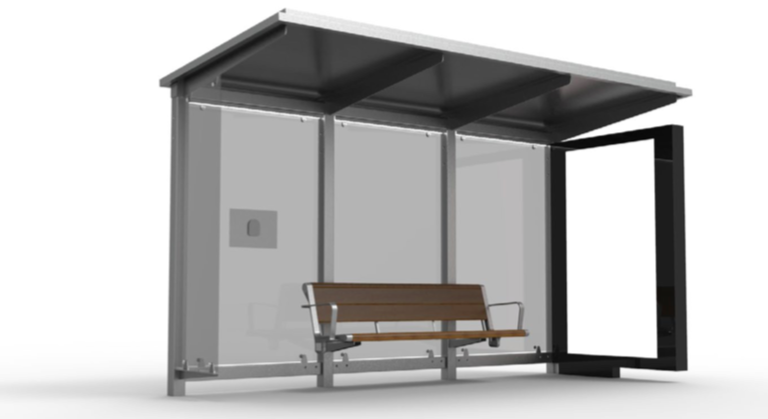Solar proponents often set out a vision for future urban environments in which PV modules is integrated into rooftops, facades and even footpaths or roads. Perth based yStop has signed an agreement with solar glass developer ClearVue to integrate its transparent PV panels into its illuminated street signs and bus stop structures.
yStop is commercializing a range of ‘smart’ public furniture products including public benches, bins and bus shelters. The products integrate display and communications technology, advertising and sensors, into the public structures.
Integrating generation into the yStop structures provides opportunities for solar PV applications, and ClearVue hopes to provide its CIGS-glass to bus shelters in WA, and street signage right around Australia – under a newly signed MoU.
“By integrating our solar glass with yStop’s illuminated street signs and advanced bus shelters, we will be able to demonstrate how ClearVue’s technologies can be deployed in situations where grid connectivity isn’t possible or is difficult, yet clear, well‐lit glass remains a requirement,” said ClearVue Executive Chairman Victor Rosenburg in a statement. Modern bus shelters require power, lighting, illuminated advertising, electronic display advertising and information screens – the ClearVue solution is a great fit for this.”
ClearVue glass integrates a strip of CIGS (copper indium gallium selenide) cells around the edges of a glass panel. Light is directed onto the semiconductor strip using a nano-coating. The glass panels are transparent – generating power and allowing light to pass through.
yStop has indicated that it will expand the exclusive distribution agreement with ClearVue for its Modular bus shelters, Link street signs and smart bins after evaluating the stability and robustness of the technology.
ClearVue reports that it has already deployed its CIGS solar glass on a bus shelter in in Port Melbourne, operated by AdShel.
While powering advertising may not be the most inspiring application of PV, it may present niche applications by which ClearVue, and other BIPV developers, achieve the scale required to bring down production costs. Alongside displaying advertising, the yStop products also allow for remote sensing, such as reporting when a bin is full, and charging of things like smartphones.
The yStop Modular bus shelters can have more traditional crystalline silicon solar glass integrated into its roof.
This content is protected by copyright and may not be reused. If you want to cooperate with us and would like to reuse some of our content, please contact: editors@pv-magazine.com.









By submitting this form you agree to pv magazine using your data for the purposes of publishing your comment.
Your personal data will only be disclosed or otherwise transmitted to third parties for the purposes of spam filtering or if this is necessary for technical maintenance of the website. Any other transfer to third parties will not take place unless this is justified on the basis of applicable data protection regulations or if pv magazine is legally obliged to do so.
You may revoke this consent at any time with effect for the future, in which case your personal data will be deleted immediately. Otherwise, your data will be deleted if pv magazine has processed your request or the purpose of data storage is fulfilled.
Further information on data privacy can be found in our Data Protection Policy.